If nothing else, at least Throne and Liberty has two separate sliders for tear duct appearance.
Earlier this week, I joined the thousands of players flocking into Throne and Liberty, Amazon's latest MMO transplant from overseas. Like Lost Ark before it, Throne and Liberty—from Lineage and Guild Wars developer NCSoft—had only gotten a South Korean release, leaving Amazon an opportunity to publish translated rereleases on global markets. I bounced hard off Lost Ark's spotty localization and arcane web of currencies, but thought maybe Amazon Games had learned a lesson in the two years since its last attempt.
Amazon Games did not learn a lesson.
Throne and Liberty has all the tantalizing Korean MMO hallmarks: an indulgent character creator, flashy combat visuals, an array of guild-vs-guild systems. Unfortunately, it's filtered through the grimy lens of Amazon's localization cost-saving, which left Throne and Liberty feeling too incoherent for me to want to bother with any of it.
Before I could fiddle with Throne and Liberty's pile of character creation sliders, there was an introductory cutscene. As the camera swept across submerged, Atlantean ruins, a narrator told me there's a star—which might be a stone, which is also a goddess. A goddess of destruction, even! She's bad, but she was shattered, and some people have pieces of her, which could be good—but maybe only if you're bad? Unclear at this juncture.
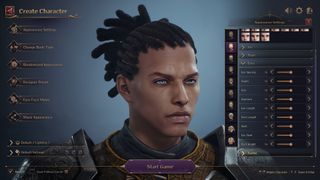
Some people, the narrator said, are born with a chunk of star goddess in them. There's a general, and he wants to use those star fragments as weapons. I assumed this wasn't good; people who want weapons are generally bad (unless they're the kinds of weapons that I want, because I'm good). The cutscene's subtitles said the general sent a witch to an island where a wizard was hiding people with stars in them. Again, signs point to bad. The cutscene's narrator, however, said the wizard sent the witch there, which made it sound good?
This wouldn't be the last time that the voiceover and subtitles contradicted each other. Throughout my brief time with Throne and Liberty, the captions I was reading were regularly at odds with the words I was hearing characters say, sometimes to the point that a questgiver would speak instructions that contradicted the quest's actual objectives.
Another cutscene played. Men in spiky armor disembarked from boats and loosed a hail of flaming arrows on a village of generic medieval innocents. An old man—the aforementioned wizard, I gathered—did magic at the armored invaders, but then a witch stepped out and vaporized him. A tragedy for many, I'm guessing. At this point, I deduced that the wizard had not, in fact, sent the witch to this island.
Then, at last, the character creator. I nudged my sliders until all the important factors—tear duct length, tear duct height, skin glossiness, etc—were where I needed them to be, and then hit the "randomize appearance" button a few times for good measure. Then, I booted my creation out the door and into life.
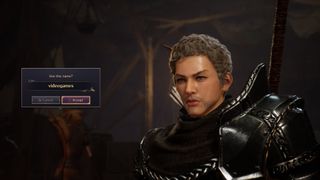
Freshly-birthed and skin glistening, I was quickly set upon by a series of convenient tutorial foes. I dispatched them as prompted with greatsword and longbow abilities, which—to their credit—have some impressive sprays of particle effects and arcs of trailing light to punctuate their heavy, thundering hits. Throne and Liberty's combat looks cool, even if it seems like it requires a more powerful mind than mine to figure out a keybinding scheme for juggling two action bars' worth of weapon skills at once.
Soon, I found myself surrounded. "Awaken the wild power in the Star Fragment," a mysterious voice urged. What the voice really meant was to push Shift, which let me transform into a wolf to run more quickly and escape. I don't know why a fragment of a destruction goddess's power translates into at-will lycanthropy, but maybe that's impolite to ask.
My tutorial capped off with a fight against a bespiked spellcaster, who revealed at the end of its health bar that, horror of horrors, it was actually the witch from the island disguised by a devious glamour. Luckily, the mysterious voice revealed itself: It was the previously-vaporized wizard, reappearing to save me from the witch's terrible spell!
Then he got vaporized again.
It was a flashback, you see, to that horrible island night all those years ago. You know, the one in the cutscene that immediately preceded the tutorial, which seemingly left my character—a survivor of the island attack—suffering from recurring vaporization dreams.
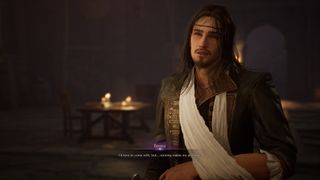
My character jolted awake from his nightmare bout of tutorial-sleep. Outside his room I found Benny, a well-meaning buffoon with a broken arm and an earnestly terrible voice-acting performance who, the game asserted, is my friend. Benny told me that our other friend, who I'm led to understand I also care about, had run off ahead, and that I should follow her to either Crescent Town or Moonshade Town, depending on whether you believe the voiceover or subtitling.
"I'd love to come with," Benny said, "but running makes my arm hurt." Okay, Benny.
I ran outside in wolf-shape to one of the most absurdly fantastical vistas I've seen in videogames. Across the rolling highlands before me was a great tree, which was also a mountain, which was also a monolith holding aloft a statue radiating with divine energy. And then a giant, flying whale with crystal tusks flew by. (According to NPC chatter, it was Big Whale Day.)
I don't know that I'd say that the scene looked good, exactly; it certainly looked expensive. But the moment might've felt more impactful if all the dialogue leading up to it had gotten a rudimentary proofreading pass. The tree also looked, I thought, like the exact kind of thing that tends to be assaulted by rampaging fantasy bad guys. And so it was: Orcs had appeared, and I had to fight them, because orcs are bad. Would any of this feel important afterwards? Well, no. And I'm still not sure what the deal with the whale was.
As I fought my way up to the roots of the great tree in a second series of tutorial fights, Throne of Liberty started to feel like a smeared, incoherent blur of fantasy images. I can't speak to whether it feels more cohesive in the original Korean release, but the Amazon Games localization feels like it has the lowest possible estimation of its players. Written quest dialogue might be at odds with the instructions being spoken by its questgiver, but why should you care? The story's a featureless static of proper nouns, but you're swinging a big sword around, aren't you? Do you really need more to keep you sticking around long enough that you might buy some cosmetics?
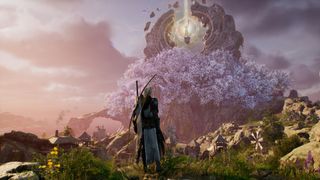
Having arrived at the tree's roots, I was sucked into and up the tree itself, where a doppelganger of Little Big Planet's Sackboy told me I was the star-born that it and/or the tree had been waiting for.
Oh, I thought. Yeah, sure. As a reward for my enthusiasm, Sackboy's cousin granted me the ability to turn into an eagle when I double jump.
Eventually an orc king took to the field, and you could tell he was the baddest one yet, because his armor had more sharp points than anyone else's. We battled. I dodged his telegraphed attacks until a new, different wizard I'd met along the way told me his eye was his weak point in a cutscene. My character threw a hatchet at it, and the orc king exploded, as things do when a hatchet hits their weak points.
In celebration of my victory, my new wizard comrade told me I had to go to another island because, hey, turns out the star fragment inside me might detonate and murder everyone in the vicinity.
I flew across the sea in eagle form, landing in a crowd of other launch night players who had just escaped their own introductory sequences—so many players that my fps was plummeting through the floor.
"None of this makes any sense," someone said amidst the sea of star-born.
"Yeah," I managed to respond as my PC ground to a halt, "This is a pasghetti-ass videogame." Then Throne and Liberty crashed so hard that Task Manager, Google Chrome, Steam, and Windows Explorer all crashed with it.

 3 months ago
129
3 months ago
129
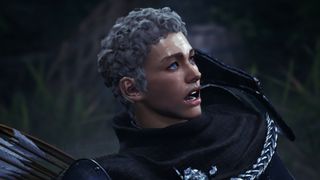

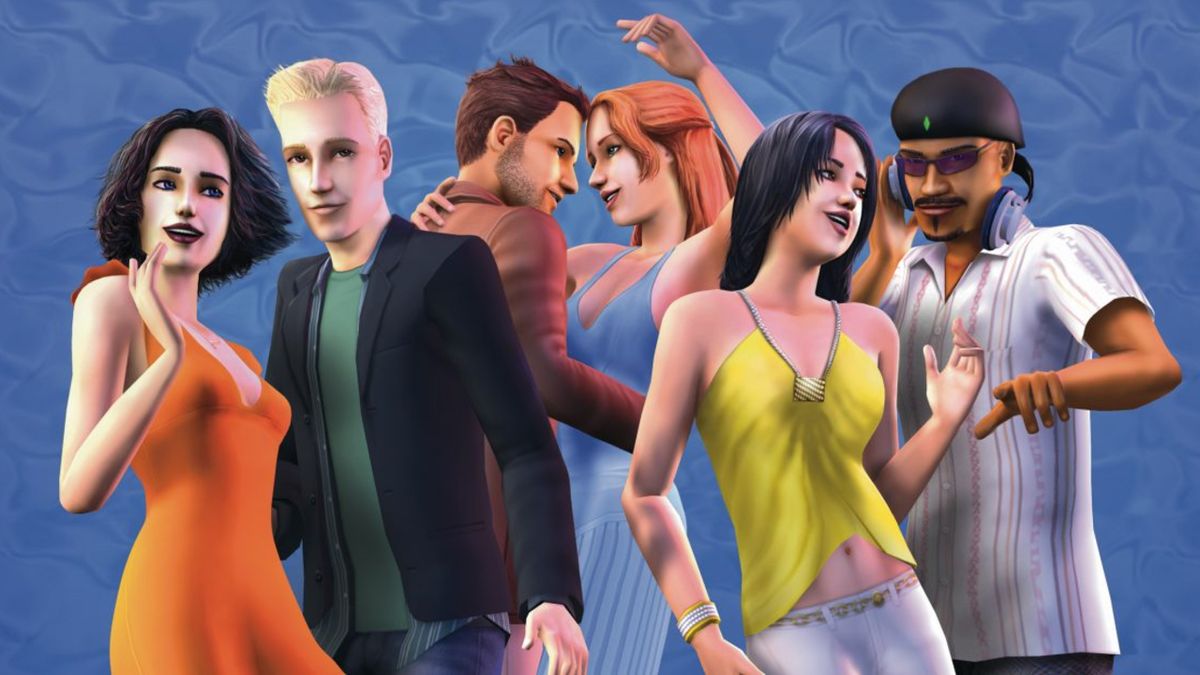
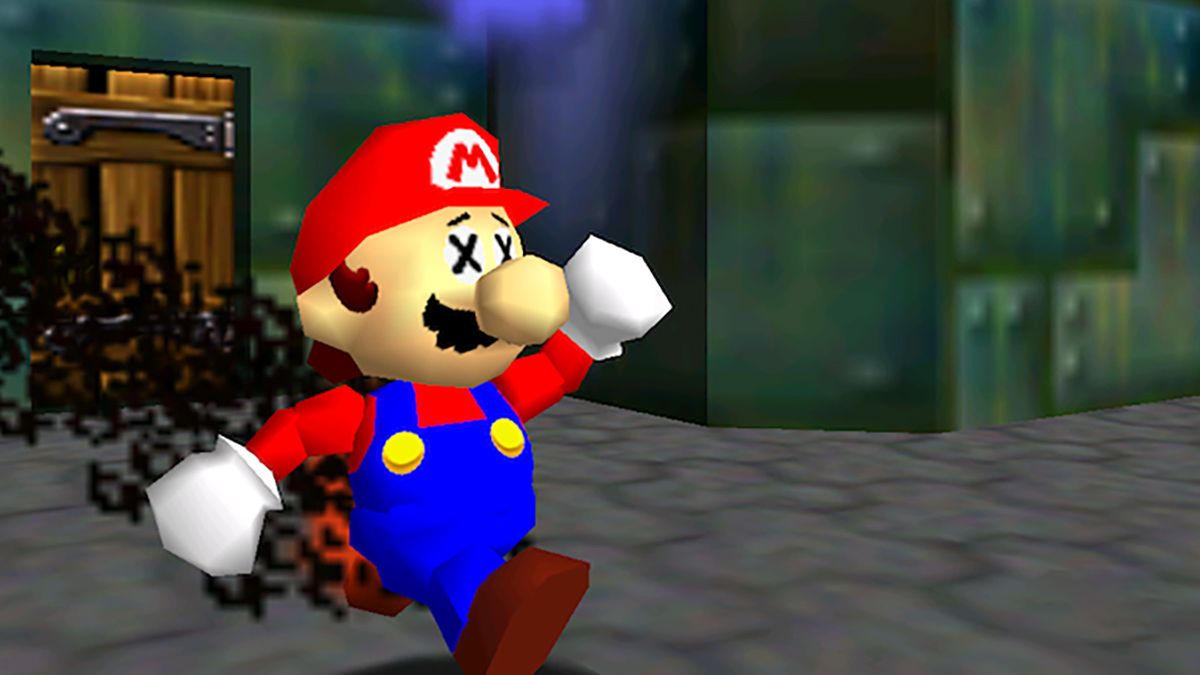
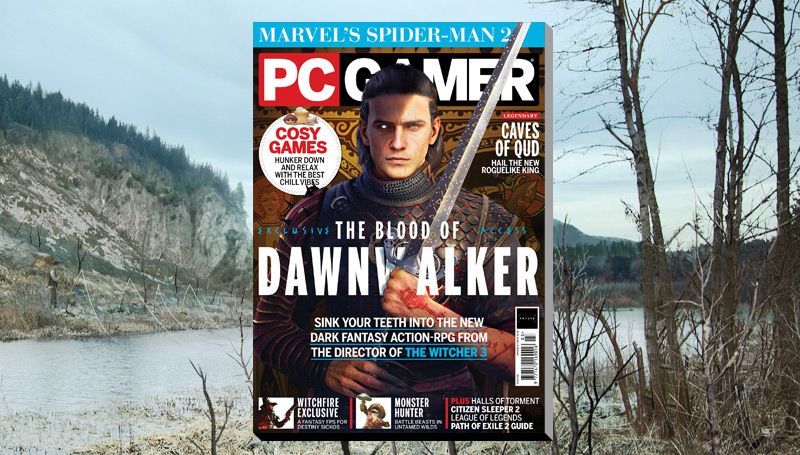



![Anime Reborn Units Tier List [RELEASE] (November 2024)](https://www.destructoid.com/wp-content/uploads/2024/11/anime-reborn-units-tier-list.jpg)
